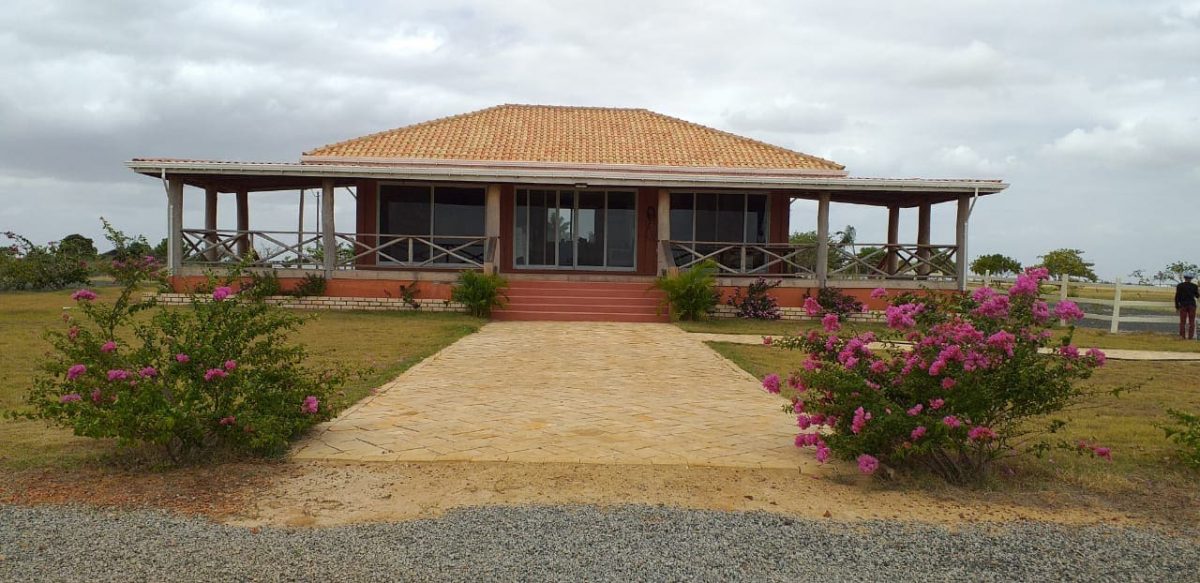While the effects of COVID-19 have hampered expansion plans for the over $1 billion Santa Fe mega farm in Region Nine, including a venture into Agri-Tourism, the company is currently focusing on food production and growing its cattle herd as it awaits changes that will come in light of the pandemic.
“Tourism has been the worst affected of all major economic sectors across the region, the country and the world by COVID-19. One of the biggest setbacks for us at Santa Fe Farm has been the delay in embarking on its tourism initiative and the obvious economic spin-offs,” Santa Fe Manager Yolanda Vasconcellos told Sunday Stabroek via an online interview.
“Considerable challenges remain ahead, starting with the unknown duration of the pandemic and travel restrictions, in a context of global economic recession. Moving forward amidst the new challenges and norms determined by COVID-19, Santa Fe remains focused and committed to providing consistently high-quality livestock and agriculture products, as we contribute our part to the country’s s aspirations of being the food basket of the Caribbean and as we continue to strive to be the largest producer and domestic supplier of agriculture products,” she added.
The mega farm, a brain child of Barbados investor Sir Kyffin Simpson, was initiated in 2010 and now occupies 29,000 acres of land for agriculture purposes.
The mega farm is an integrated one that focuses on crops, livestock, aquaculture and fruits. Current crops under cultivation include pak choi, bora, and okra, and ground provision as well as some non-traditional produce, while the livestock consists of cattle, horses, pigs, sheep and poultry.
Vast acreage is dedicated to planting rice, which is then milled and exported to Brazil. But measures implemented due to COVID-19 have hindered the exportation and in the interim the farm is hoping that the road network is rehabilitated to ease the burden of transporting its produce when it can resume exports.
“We hope to resume rice exports to Brazil sometime in the future. We have exported over 12,000 tonnes of rice to Brazil under challenging circumstances but we are hoping for better bridges and roads to be able to bring down our transport costs from farm to Lethem and be more competitive with our freight costs,” Vasconcellos explained.
Ranch life
Since late last year, the farm had been preparing to expand and embark on tourism, in particular Agro-Tourism, where according to Vasconcellos the farm would be open to visitors for the purposes of “enjoyment, education and other active involvement”. “Agri-Tourism is the next big thing at Santa Fe Farm. This allows us to share the real rural life of the Rupununi savannahs and the experience of life on a farm, local food and culture,” she said.
But the launch of the initiative, scheduled for the Easter season this year, was hampered as the world grappled with the effects of the COVID pandemic. “COVID has led to significant uncertainty and chaotic conditions in both of the industries that we at Santa Fe directly operate in – Agriculture and Tourism,” Vasconcellos lamented.
The farm’s diversification to agro-tourism was decided on to give visitors, both local and foreign, a “Region Nine experience they would never forget.”
“The Santa Fe Farm is the ideal place to enjoy a taste of farm life with all the amenities of a resort. We offer unforgettable experiences in a rustic setting in the northern savannahs, friendly service, great food and a look at life on a real ranch. At Santa Fe we offer more than just relaxation and scenic views. We are the perfect place to experience the ranch life in more ways that you might expect,” Vasconcellos detailed.
“Enjoy catch and release fishing, or spend a day horseback riding or hiking through the farm’s many trails. We have a number of other activities and trust me when I say that you will not be bored because they include hiking, boating, riding…. And if you just want serenity, Santa Fe has that too because there is no other experience that laying in the lush grass or from your room and star gaze. You can also relax in a hammock from the verandah of the Lodge,” she emphasised.
According to her, their two-bedroom two-bathroom eco-lodges capture a scenic view of the Pakaraima Mountain range and their staff will cater to the vacationer’s every need, giving them a five star hotel experience with all the amenities of an eco-lodge.
She argued that Santa Fe Lodge is ideal for a family getaway, a quick trip with friends for a weekend, safari stop overs and a rest stop for hikers, bikers, caravan travelers.Although COVID-19 has affected the farm’s expansion plans, none of its staff has been furloughed or laid off as the company hopes to pursue its diversification plans. These include diversifying its cattle herd. “Santa Fe has been focusing on expanding the cattle herd with breeding bulls of the Long Horn and Brandford breeds,” Vasconcellos related.
In 2017, Director of the Farm Richard Vasconcellos had told Stabroek News in an interview that the farm was seeking “higher lands” for a cattle expansion project, even as it awaited the APNU+AFC government’s go ahead for an additional 20,000 acres of land.
They were not granted the lands and at one time then Minister of State Joseph Harmon had callously referred to the cattle programme as one to graze “two scrawny cows”.
The farm is also working on increasing its holdings of livestock and fish, which is why more pasture lands are being developed for feed.
Vasconcellos also mentioned the farm’s shift towards using renewable energy resources. “As Santa Fe Farm continues to embrace Green Energy and Go Green, we have installed a state-of-the-art photovoltaic system that is providing power to the buildings and compound. This creates no greenhouse gases and reduces the carbon footprint of the farm business,” she proudly said.
